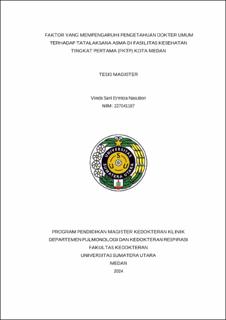Faktor yang Mempengaruhi Pengetahuan Dokter Umum terhadap Tatalaksana Asma di Fasilitas Kesehatan Tingkat Pertama (FKTP) Kota Medan
Factors Influencing General Practicioner’s Knowledge of Asthma Management in Primary Health Care Facilities (FKTP) Medan City

Date
2024Author
Nasution, Vinda Sari Ermiza
Advisor(s)
Permatasari, Amira
Pradana, Andika
Metadata
Show full item recordAbstract
Background : Asthma is a chronic disease of the respiratory tract due to the
inflammatory process so that the respiratory tract becomes sensitive to the entry of
foreign objects that cause hypersensitive reactions, this causes wheezing,
coughing, chest tightness, and difficulty breathing especially at night and early
morning. Adequate knowledge of general practitioners can improve asthma care,
reduce severity of disease and mortality rates in patients. This study aims to
identify factors that influence knowledge of asthma management in primary
health care facilities (PHC) in Medan City.
Method : This cross-sectional study involved 90 general practicioners in primary
health care facilities in medan city, selected through consecutive sampling. Data were
collected included respondent characteristics age, length of service at primary health
care facilities, number of asthma patients treated in 1 month, source of knowledge
about asthma management, history of asthma management training, and general
practioner’s knowledge. Study used a questionnaire that had been tested for validity
and reliability with result of guttman scale r count of 0,489 and Cronbach’s alpha
value of 0,93. Statistical analysis using SPSS software assessed associations between
these variables and the chi-square and fisher exact tests were carried out according to
the number of samples.
Results : In this study, it was found that general practicioner have sufficient knowledge
in asthma management (54,4%). Significant association were observed between
general practicioner’s knowledge of asthma management and factors such as age and
source of knowledge. However, no significant associations were found for variabels
such as length of service at primary health care facilities, number of asthma patients
treated in 1 month, and history of asthma management training.
Conclusion : General practicioners in primary health care facilities need to improve
their knowledge of asthma management to improve quality of care for asthma patients,
and more applicable training on asthma management needs to be carried out so that it
can be implemented by general practicioners in primary health care facilities.
